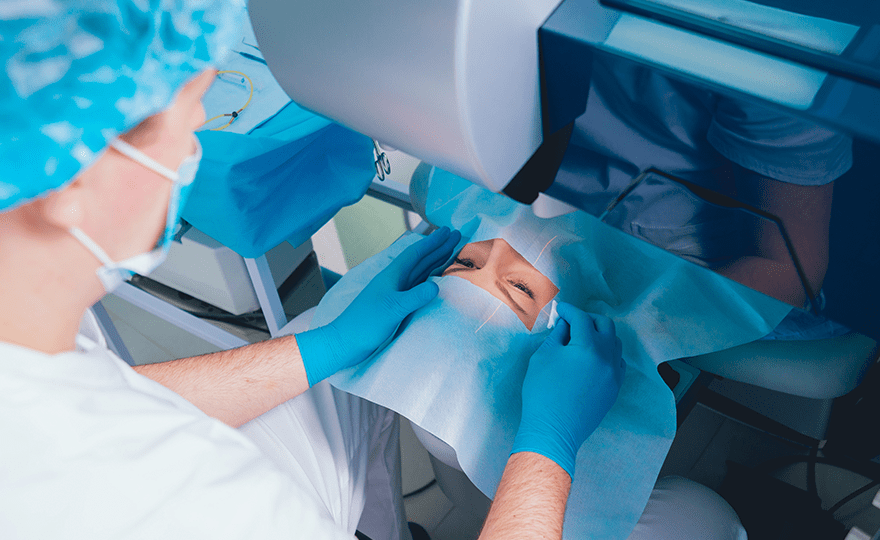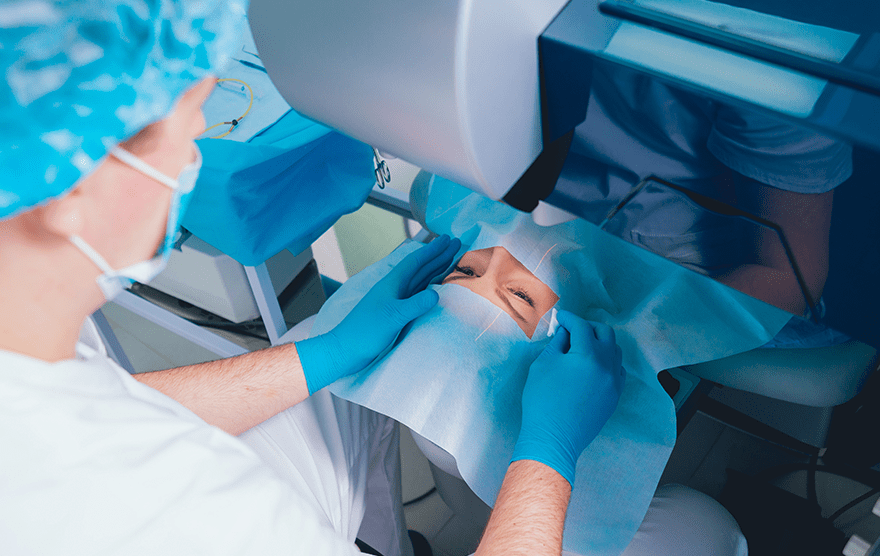
Lasik Eye Surgery Eligibility

Are you tired of your eyeglasses or contacts and wish to get rid of them ASAP? If yes, you must have read or heard about LASIK surgeries that help you say goodbye to your vision accessories. Whatever you must have read or heard is true, because LASIK procedures are painless and quick. Moreover, you will be ready to return to work in no time. But the question you must ask yourself is, am I a suitable candidate for LASIK
surgery?
In the following sections, we will discuss the conditions that could be treated with LASIK and the criteria that make you a good candidate for LASIK procedures. We’ll explore everything from LASIK surgery eligibility to the age limit for laser eye surgery and who makes a good candidate.
What is LASIK?
LASIK, or Laser-Assisted In Situ Keratomileusis, is a surgical procedure that reshapes the cornea (the transparent dome at the front of the eye) to correct vision-related issues. In this procedure, a small flap in the cornea is made. Through this flap, a controlled laser reshapes the cornea, and the flap is folded back into its place. On average, it takes about 15 minutes to operate on one eye. This procedure is almost painless, and the recovery period is pretty quick.
Eligibity criteria for LASIK surgery
Now that you know about the LASIK procedure and what vision-related conditions it could fix, it’s time to find out whether your profile ticks all the boxes to be eligible for it. Below are the major lasik eligibility criteria for Lasik.
Age
The age requirement to get LASIK treatment is that you must be above 18 years of age..
Stable Vision
Getting LASIK treatment to fix refractive errors in the eyes is also subject to a stable prescription. If the prescription for your eyesight hasn’t changed for at least six months, then you are clear for LASIK. People with changing vision prescriptions should wait it out till it stabilises.
General Health
Your overall health should be good to get LASIK eye surgery. Patients with auto-immune diseases,, and cataracts might not be eligible for the LASIK procedure. Diabetics are advised to maintain a strict glycaemic control and can be considered for refractive surgery after careful assessment. Certain health issues and their medication could impact the healing of eyes post LASIK. An eye specialist is the best person to check your health condition and suggest whether you should go for LASIK or not.
Corneal shape and thickness
Patients with an unusually thin cornea or corneal scarring are unsuitable candidates for LASIK. At the consultation time, your doctor will check the cornea’s thickness and decide whether you are eligible for LASIK.
Eye Injury
Patients with a history of severe eye infection or eye injury might not qualify for LASIK. Some superficial scars can be tackled however, that is subject to examination during consultation.
Pregnancy
Hormonal changes during pregnancy affect the stability of your eye prescriptions. If you are nursing or pregnant and looking forward to LASIK, you should wait it out.
Eye Conditions
Conditions like dry eye syndrome or large pupils may affect the suitability for LASIK surgery and will be assessed during pre-operative evaluations.
Stable General Health
LASIK candidates should have stable general health without conditions that may impair healing, such as uncontrolled diabetes or autoimmune diseases.
Realistic Expectations
Candidates should have realistic expectations about the outcomes of LASIK surgery and understand the potential risks and limitations.
It’s essential to undergo a comprehensive eye examination and consultation with a qualified ophthalmologist to determine your specific eligibility for LASIK surgery based on your eye power, corneal thickness, corneal shape, overall eye health, and other factors. The surgeon will assess whether LASIK is suitable for your individual needs and circumstances. They will also discuss alternative options if LASIK is not recommended for your particular eye condition.
What are the eye conditions LASIK can treat?
LASIK is a refractive error correction procedure that can fix majorly 3 types of vision-related issues:
Myopia (Nearsightedness)
It’s a condition in which the faraway objects appear blurry, but the nearby objects appear clear. This usually happens when the curvature of the cornea is more than usual.
Hyperopia (Farsightedness)
When the distance vision is clear and sharp, but the nearby objects appear blurry, this refractive error is called Hyperopia. When the cornea isn’t curved enough (too flat), this condition affects the vision.
Astigmatism
This condition arises when the cornea’s shape isn’t spherical or regular in all meridians. Due to this condition, the vision is not crisp or sharp.
Conclusion
Those were the major lasik eligibility criteria for Lasik. LASIK procedures are highly successful and painless, and you get done with them in no time. If you are looking forward to getting LASIK treatment for your eyes, go ahead and book a free consultation with our team of eye specialists at Planet LASIK.
FAQs on Lasik Eligibility Criteria
What is the minimum age requirement for LASIK surgery?
The minimum age requirement for LASIK surgery is typically 18 years old. This ensures that the eyes are fully developed and stable before undergoing the procedure.
Is there a maximum age limit for LASIK surgery?
There is no strict maximum age limit for LASIK surgery. As long as the individual meets the other eligibility criteria and their eyes are healthy, they can undergo LASIK surgery. However, age-related eye conditions such as cataracts may affect eligibility.
Can I undergo LASIK surgery if my vision prescription is still changing?
LASIK surgery is typically recommended for individuals with a stable vision prescription for at least one year. If your prescription is still changing, it’s best to wait until it stabilizes before considering LASIK.
Are there any medical conditions that may disqualify me from LASIK surgery?
Yes, certain medical conditions may disqualify you from LASIK surgery, such as autoimmune diseases, uncontrolled diabetes, or conditions affecting the cornea. It’s important to discuss your medical history with your eye surgeon to determine your eligibility.
Can I undergo LASIK surgery if I have dry eyes?
LASIK surgery may not be suitable for individuals with severe dry eye syndrome. However, mild to moderate dry eye can often be managed before surgery. Your eye surgeon will assess the severity of your dry eye and determine your eligibility accordingly.
Is pregnancy a contraindication for LASIK surgery?
Yes, it’s generally recommended to wait until after pregnancy and nursing before undergoing LASIK surgery. Hormonal changes during pregnancy and nursing can affect vision, making it difficult to determine an accurate prescription.
Will LASIK surgery eliminate my need for glasses or contact lenses?
LASIK surgery can significantly reduce or eliminate the need for glasses or contact lenses, but it may not guarantee perfect vision. Some individuals may still require glasses for certain activities such as reading or driving at night.
Who are not eligible for LASIK?
Individuals who are not eligible for LASIK surgery include those with unstable vision changes, underlying eye conditions such as keratoconus, glaucoma, or severe dry eye syndrome, and those with thin or irregular corneas. Additionally, individuals with uncontrolled diabetes, autoimmune diseases affecting the eyes, or other systemic conditions that may affect healing may not be suitable candidates. Pregnancy and nursing women should typically wait until after this period before considering LASIK.
